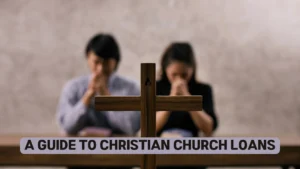Welcome to the comprehensive guide on Lenders For Churches: Top Lenders Specializing in Church Loans & How to Choose the Right One. We embark on the journey of growth, renovation, or financial stability, and the role of specialized lenders for churches becomes increasingly significant. Today, we delve into the world of church financing, relieving light on the key players in the field and providing insights on how to navigate the process of choosing the right lender.
In the ever-evolving landscape of church finance, finding a lender attuned to the unique needs of religious organizations is paramount. Whether you are a clergy member, a church board member, or part of a congregation curious about securing financial support, understanding the landscape of lenders for churches is crucial. We will explore the tailored solutions these lenders offer, the intricacies of church loans, and the factors to consider when selecting the ideal financial partner for your church’s journey.
Join us on this insightful exploration into the realm of “Lenders For Churches,” where we demystify the process, highlight the key players in the industry, and equip you with the knowledge to make informed decisions that align with the financial health and longevity of your spiritual home.
In our exploration today, we aim to illuminate the complexities of church financing. We’ll take a closer look at the benefits, key considerations, and various options to bolster and broaden the impact of these critical community centers. This post is designed to be a resource for anyone involved in church administration, those who offer financial advice to these institutions, or simply for those curious about how religious organizations manage their funds. Join us as we navigate the potential avenues for securing financing through specialized lenders tailored to the needs of these vital establishments.

Understanding Lenders for Churches
When exploring financing options for churches, diving deeper into the unique requirements and offerings that lenders for churches bring to the table is essential. Specialized church lenders understand the particular needs of religious organizations, from constructing new facilities to renovating existing ones or simply refinancing existing debt. Unlike traditional loans, church financing may come with more flexible terms that account for the fluctuating tithes and offerings that constitute a church’s revenue.
Potential borrowers should look for lenders that offer competitive interest rates, long repayment terms, and an understanding of non-profit accounting practices, which significantly differ from those of standard businesses. Moreover, pastoral leaders must weigh the benefits of working with lenders experienced in non-profits, as this expertise can be invaluable in navigating the complexities of church finance. With the right lender, churches can gain access to the necessary capital while ensuring that their financial strategy aligns with their spiritual mission.
Church loans are an excellent way for churches to finance the things they need, from cash flow to real estate to paying off debt. Churches in California (church loans California) can get a personal loan from their church.
Church loans are available as a representative payee, meaning that the borrower’s creditors will not be alerted to their application and will not need to use their credit score as collateral against the loan. Church loans are also available for real estate purchases, refinancing, new construction, renovation, or any other purpose that benefits the church. Churches in California can get a loan from their church. (church loans California)

What is Church Financing, and Why Does it Matter?
Church financing refers to the specialized loans and financial services provided to churches and religious organizations for various purposes such as building construction, renovation, equipment purchase, or debt refinancing. This type of financing matters greatly because churches often face unique challenges in acquiring funds through traditional lending sources due to their non-profit status, irregular income patterns, and distinct operational purposes. Consequently, lenders tailored to churches understand these nuances and offer loan products that align with the church’s mission, values, and financial capabilities.
Following up on the importance of church financing, religious institutions must partner with lenders that offer competitive rates and exhibit a deep comprehension of the church’s objectives and needs. Lenders experienced in church financing can provide a wide range of solutions, from long-term mortgages for property acquisition to short-term loans for immediate repairs or upgrades. These financial experts are equipped to guide church leaders through the often complex process of loan application and approval, ensuring that the terms are favorable and that repayment plans are sustainable for the church’s budget.
By selecting the right financier, churches can secure the necessary funds to expand their facilities, enhance their ministries, and further serve their communities without compromising their core principles and financial health. Thus, finding a reputable and understanding church lender is paramount in successfully navigating the economic landscape and ultimately performing the vital work that houses of worship set out to accomplish in their communities.
The Options
It’s crucial to dive deeper into understanding the various lending choices available to churches. Securing funds for expansion, renovations, or operational costs demands a lender that offers competitive rates and understands the unique needs. While familiar to many, traditional banks might not always provide the flexible terms churches require. An alternative is to consider credit unions or financial institutions specializing in non-profit financing, often presenting customized loan options tailored to churches. Online lenders have also emerged as a practical solution, offering quick application processes and rapid funding.
It’s important to weigh the pros and cons of each type of lender, keeping in mind their interest rates, loan terms, and any additional services they may provide. Utilizing search terms like “church financing options,” “faith-friendly lenders,” and “non-profit financial support” will guide you to a wealth of resources tailored to assist churches in finding the ideal lending partner for their financial goals.
History of Lenders for Churches
Historically, churches have sought financial support to expand their ministries, upgrade facilities, or even maintain operations. However, the lending landscape for religious institutions has evolved considerably over time. Gone are the days when the only options were traditional banks or denominational lending programs. Today, specialized church lenders have emerged, offering tailored solutions that address the unique needs of religious organizations. These lenders often provide more flexible terms and a deeper understanding of churches’ financial challenges. Whether for construction, renovation, purchase, or refinancing existing debt, these modern lenders are dedicated to empowering faith-based communities to thrive without compromising their missions.
As churches navigate their financial journeys, they must remain informed about the latest trends and options in church financing to make the best decisions for their congregations.
How to Choose a Lender for Your Church
Continuing our discussion on selecting the right lender for your church’s financial needs, church committees must thoroughly evaluate potential lenders’ experience and specialization. Lenders with a history of working with religious institutions will more likely understand churches’ unique financial circumstances and lending requirements. Before deciding, search for online reviews that showcase a lender’s performance with similar clients. Keywords like “church capital,” “church capital corporation,” and “church loans” can be included in your searches to help you find top-rated professionals experienced in this niche market. Remember, the right lender for your church will not only offer competitive rates but also align with your church’s values and mission, providing a solid foundation for a long-lasting financial partnership.
Church loans can help you with everything from financing your church to real estate.
Church loans are a great way to meet the financial needs of your church, whether you’re looking to finance a new building or refinance an existing one. They can also help pay off debt, expand your ministry, or fund any other financial need you might have.
Church loans come from various sources, so you must understand how they work before you apply for one. If you’re considering applying for a church loan, take some time to learn about the different types of lenders and how they operate before making any decisions about how much money you’ll need and what kind of lender will work best for your situation.

Conclusion
In conclusion, choosing the right lender for your church is a decision that extends beyond mere interest rates and loan terms. It’s about finding a partner attuned to the unique needs of religious institutions, one who respects your church’s core values and mission. This process involves diligent research and vetting, seeking out those with demonstrated expertise in faith-based lending. As you dive into reviews and explore case studies, remember to include key phrases such as “church capital,” “church capital corporation,” and “church loans” in your search criteria to ensure you’re connecting with the best-suited professionals in this specialized field.
Ultimately, the ideal lender for your church will provide financial support and a symbiotic relationship that helps foster growth and sustainability for your congregation. By prioritizing experience, compatibility, and shared values, your church committee can secure a lending partner that complements and enhances your ministry’s goals and initiatives.
Frequently Asked Questions
What kind of financing options are available through lenders for churches?
When exploring financing options for churches, lenders typically provide various tailored solutions to meet the specific needs of religious organizations. These options often include long-term loans for acquiring or constructing new property, refinancing existing debt, and short-term loans for renovations or upgrades. Additionally, churches can look into lines of credit, which offer flexible access to funds for ongoing expenses or unexpected costs. Some lenders even specialize in church bond financing, which allows church members to invest directly in the church's growth. Church leaders must assess terms such as interest rates, repayment periods, and associated fees, ensuring that the chosen financing option aligns with the church's financial health and growth plans. Furthermore, lenders experienced in working with religious institutions can provide valuable advice on tax exemptions and other economic benefits available to churches. By understanding the full spectrum of financing solutions, congregations can make an informed decision that supports their mission and strengthens their financial foundation.
Are there Any Special Requirements for a Church to Qualify for a Loan from These Lenders?
When securing a loan for a church, lenders often impose specific criteria to mitigate risks associated with such specialized lending. First and foremost, it's essential for a church seeking financing to demonstrate a consistent and reliable income stream, usually through regular tithes, offerings, and potentially other fundraising activities. A strong credit history is also essential; lenders will meticulously review the church's financial records, including past loan repayments, to ensure they can manage new debt responsibly. Furthermore, a well-documented plan for using the loan proceeds is crucial, as lenders prefer to support projects that contribute to church growth and financial stability, such as building renovations or expansion efforts that can bring in more members and, thus, more income. Potential lenders may also assess the church's leadership team to ensure they have the experience and capacity to manage the project and repay the loan. In summary, churches must be prepared to present a thorough financial picture and a solid plan for the future to access funding through these specialized lending institutions.
Can These Lenders Provide Loans for Church Renovations or Only New Construction Projects?
Indeed, lenders specializing in financing for churches often extend their services beyond just funding new construction projects. These institutions recognize the importance of maintaining and upgrading existing facilities to serve congregations and their communities better. Therefore, many lenders offer loans tailored explicitly for church renovations. This encompasses major structural overhauls and minor updates like installing new HVAC systems, updating electrical wiring, or enhancing audio-visual capabilities. By offering such specialized loans, these lenders ensure churches can continue providing a safe and welcoming environment for worship and community events. When considering a lender for your church's renovation needs, it's essential to assess their experience in this niche market and inquire about the variety of loan products they provide that cater to the unique needs of religious establishments.
What Information Do Churches Need to Provide When Applying for a Loan with These Lenders?
Following the detailed rundown of information that churches must compile when seeking a loan, these institutions must understand the following steps: "Maximizing Loan Approval Odds for Your Church." After you've gathered financial statements, projected budgets, and attendance records and outlined your intended use for the funds, your focus should shift toward strengthening your church's loan application. Lenders for churches often look for a solid track record of financial responsibility, so ensure that your credit reports are accurate and showcase your church's fiscal reliability. It's also beneficial to highlight your congregation's growth potential and community impact, which can be influential factors for faith-based lenders. Present a clear vision of how the loan will contribute to your church's mission and goals - this will demonstrate strategic planning and resonate with lenders' intentions to support religious institutions. This stepwise, strategic approach can significantly enhance your chances of securing a loan to propel your church's initiatives forward.







